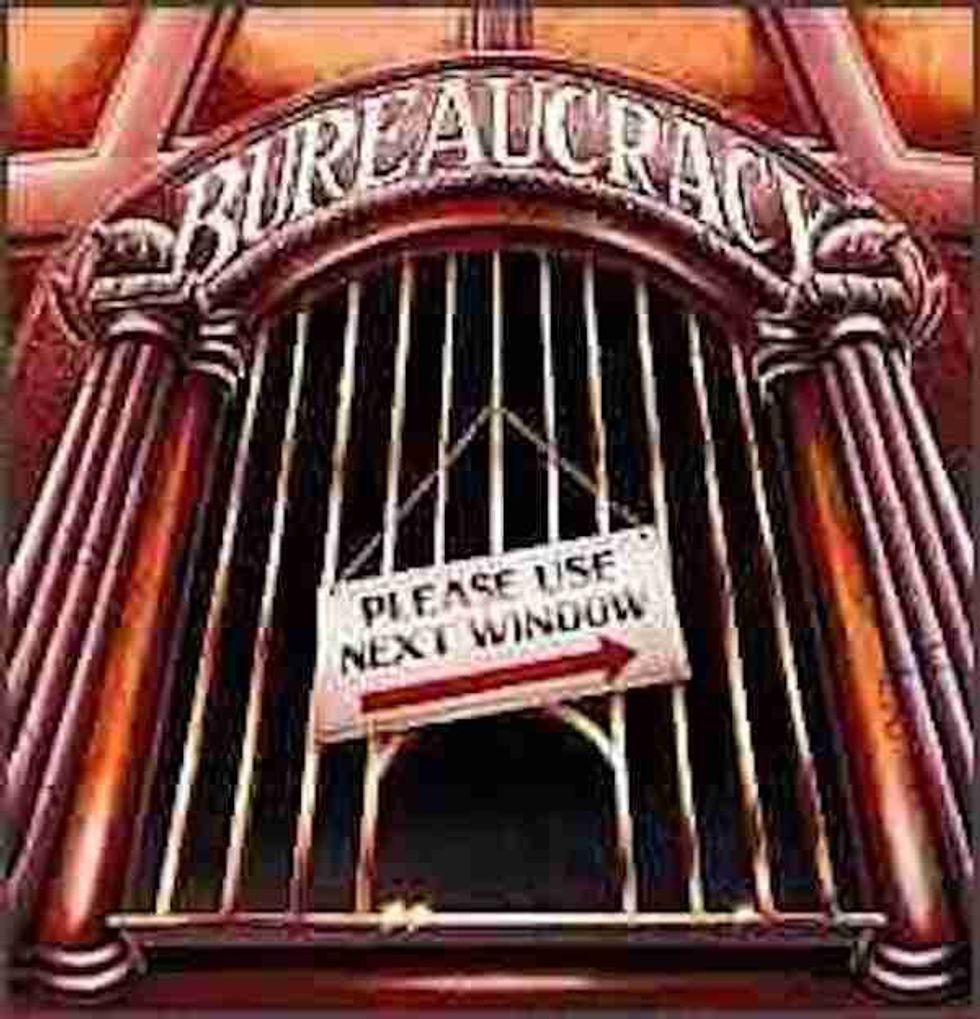" Bureaucracies are inherently antidemocratic. Bureaucrats derive their power from their position in the structure, not from their relations with the people they are supposed to serve. The people are not masters of the bureaucracy, but its clients." - Alan Keyes
It goes without saying that there is nothing in our government more egregious or tyrannical in political structure than the federal bureaucracy. Why, however, do I arrive at such a premise immediately in a "pre-cursor" statement to the analysis? The answer to this is pretty simple: The federal bureaucracy isn't mentioned anywhere within the rubric of the Constitution, which in a sense indicates that it is in part "free" from its confines."
Any power that is unbalanced immediately shifts to becoming tyrannical. It is a trend that is historically precedented, and it will continue to rear its putrid face if we further allow government to believe that it can legislate freedoms, and now dictate through the executive branch's tentacles in the federal bureaucracies.
As The Conservative Review clearly dictates, "The executive branch of the federal government is an ever-growing behemoth that is slowly invading every facet of American life. The only way this will ever change is if conservatives finally realize that when they control Congress and the White House, that is only the beginning of the fight. They can effect change and implement conservative public policy only if they tame — and dramatically reduce — the vast federal civil service bureaucracy in the executive branch."
From the IRS (which is responsible for the ridiculous 70,000 page tax code that has crippled small businesses within the private sector), to the Department of Justice, where as of late has become a cesspool for partisan politics and kangaroo court justice), to the Environmental Protection Agency (which has instituted over 3,000 pages of federal regulations on energy output that has decimated the energy market) to the Department of Veterans Affairs (which is responsible for extraordinarily backlogging disability appeals, denying mental health services to over 125,000 veterans, and extending the wait-list for first-time applicants to three years and over), to Planned Parenthood (which is responsible for using taxpayer funds through Title X family planning appropriations to engage in nearly 7,000,000 abortions from 1978-2014), to the National Security Agency (which recently had been revealed by former NSA operative Edward Snowden to have been tapping into the cellphone frequencies of millions of American citizens), to the Department of Education (which has nationalized public-school curriculum through its common-core initiative that has greatly contributed to an epidemic of dropping out of high school and low-academic performances amongst students), to the Federal Reserve (which according to the Business Insider is responsible for lending $7.7. trillion dollars to bailout some of the nations largest banks), the federal bureaucracy has grown to encompass a trend towards governing nearly every aspect of human life within the constituency through fiat.
What is more remarkable about this growing "fourth-branch of government" is its ability to avoid being held accountable to the American voter as opposed to the elected positions held within Congress and the presidency.
being mentioned in the Constitution plays to the advantage of the Executive branch, for what the president can't do legislatively or judicially, he allocates these responsibilities to his subordinate pool of department "secretaries" in order to circumvent the Constitutional "red-tape" that binds him.
What is slipperier still is that the federal bureaucracy uses millions to billions of taxpayer dollars to further their agendas.
For example, Planned Parenthood is allocated a massive $500,000,000 per year and the Department of Veterans Affairs is currently positioned to receive $187,000,000,000 dollars in President Obama's new 2017 budget (ironic that their defense for grossly mishandling their clients involves underfunding); all in taxpayer dollars.
The way a federal bureaucracy is generated is actually quite simple; at least, from the standpoint of a polished politician:
According to the late Jewish-German novelist Franz Kafka,
"Every revolution evaporates and leaves behind only the slime of a new bureaucracy."
This is pretty astounding, considering that many if not most of the major bureaucracies that we fund through taxpayer funds stemmed from sort social justice revolution based on some perceived grievance that thereby justified the creation of a bureaucracy in its honor that acts on its own accord in dictating policy to the populace outside of the direct scrutinization of the Legislature or the citizens.
As Mary McCarthy, a communist-sympathizer and liberal activist, ironically stated in The New Yorker in 1958,
"Bureaucracy, the rule of no one, has become the modern form of despotism."Indeed, the bureaucracies are indeed the rule of "no one" except the political clouts that drive them and the secretaries that oversee them. It represents the existence of an interconnected web of smoke and mirrors that was designed to empower one branch of government over the rest and moreover to conceal any unconstitutional overreaches, wasteful spending and breaches an institution within the web may have engaged in.
For example, according to the Washington Times,
"Over the last five years, the GAO said it has made 440 recommendations across 180 areas where federal agencies can cut back on fragmented, overlapping and duplicative spending programs, but as of November 2014, only 29 percent of the actions were fully addressed, according to the report. Private watchdogs say the GAO survey only strengthens their case that government waste and abuse are rife, and that it is taxpayers who have to foot the bill. 'According to GAO, the federal government made about $125 billion in improper payments in 2014 alone. Solving that would give you enough money to kill the death tax, repeal the federal gas tax and airline ticket tax, end all federal excise taxes on alcohol and tobacco and remove all federal taxes on phone and Internet bills,' said Ryan Ellis, tax policy director at Americans for Tax Reform. "
But for a government that is ransacked with a seemingly insatiable desire for power, consumption of jurisdictional authority appears to be top priority for the federal bureaucracy as opposed to protecting the liberty of the American constituency, which presents dangers of massive proportions, specifically due its unhinged state from the Constitution.
It is no wonder then, that when President-elect Donald Trump nominated anti-establishment types to fill his cabinet, the backlash to such appointments were quite telling; specifically from the establishment socialists.
Any initiative to strip power away from the bureaucracy is immediately met with fierce opposition, and the establishment attempts to classify such initiatives as an attack on the social revolutions that spawned the bureaucracy.
What deception that the government tries to take its constituents for nothing but fools! During the years after Obamacare was established, which has nearly destroyed healthcare coverage for constituents and has bankrupted small businesses, one of The Affordable Care Act's architects Jonathan Gruber made a statement regarding the bill's passage that encompassed the theory of the federal government trying to keep its constituents in complete ignorance.
As reported by The Hill, "
"Lack of transparency is a huge political advantage...And basically, call it the stupidity of the American voter or whatever, but basically that was really, really critical for the thing to pass."As an analyst, I often wonder of the hypothetical reality where the American constituency is educated about the importance of limited government and the Constitutional assurances that the "checks and balances" are absolute and infallible. The explosion of the federal bureaucracy and the jurisdiction that it has been given without Constitutional restrictions outlines the greatest fears held by the Framers about the rise of tyranny and its despots.
When the federalist system of checked and balanced power realizes the power of "alliance" within, essentially all branches of government becomes useless for all purposes of oversight, and the government collectively works to increase in its ability to consume more power and control for the "greater good" in somewhat of a "utopian" state. And they are willing to use the federal bureaucracy as the executer of this agenda at the expense of the taxpayer.
As the Washington Times analyzed,
“'The report just emphasizes for the umpteenth time that wasteful spending is marbled throughout the bureaucracy, and there are hundreds of millions in savings there for the taking, if only Congress would exercise its constitutional mandate to exercise oversight and then act to winnow out the programmatic underbrush and force overdue management changes.' said Leslie Paige, vice president for policy and communications at the nonpartisan Citizens Against Government Waste."The biggest government waste ever perpetrated in the name of the "greater good" was the spawning of the federal bureaucracy, which has slowly made its way to becoming a fourth branch of government. There is conjecture that this new branch maintains more power and direct authority over citizens than any of the other branches.
According to the Washington Post,
"This exponential growth has led to increasing power and independence for agencies. The shift of authority has been staggering. The fourth branch now has a larger practical impact on the lives of citizens than all the other branches combined.
The rise of the fourth branch has been at the expense of Congress’s lawmaking authority. In fact, the vast majority of “laws” governing the United States are not passed by Congress but are issued as regulations, crafted largely by thousands of unnamed, unreachable bureaucrats. One study found that in 2007, Congress enacted 138 public laws, while federal agencies finalized 2,926 rules, including 61 major regulations."
If we as a people do not realize the exponential threat facing us as a nation in the increasing of power in the federal bureaucracy, the "utopian initiative" will become complete and all aspects of liberty will be subject to the whims of Washington bureaucrats. God help us all....





















